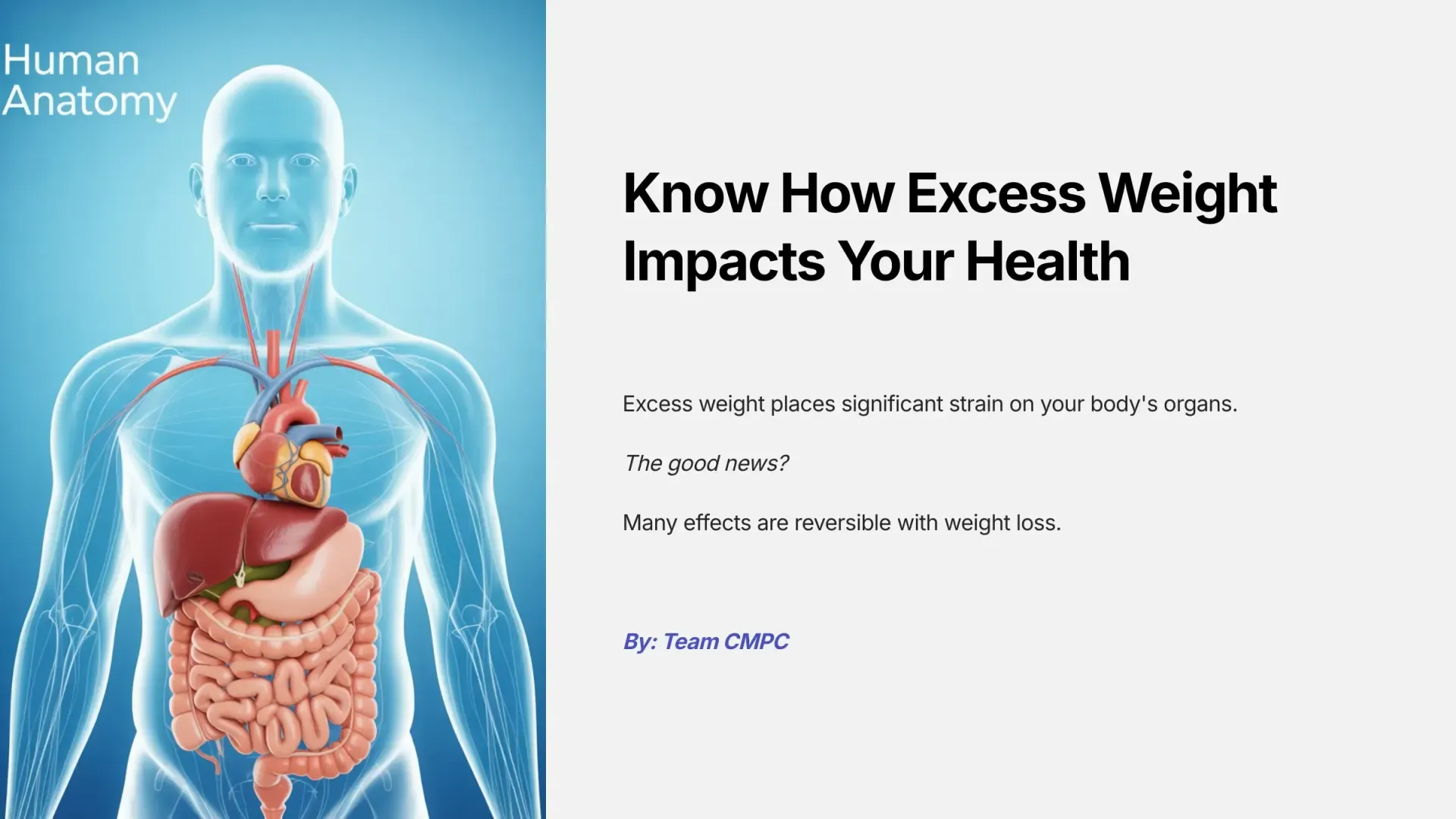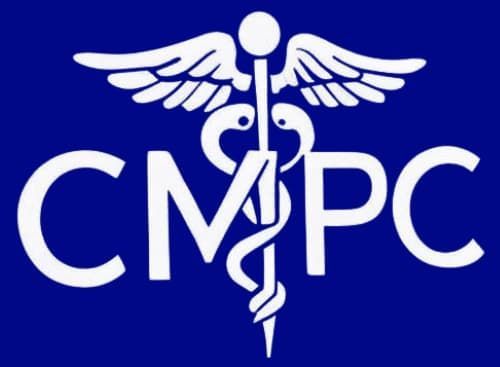
If you're considering weight loss treatment in Nepean, you may be concerned about potential effects on your vital organs. This thoughtful and essential question deserves a thorough, honest answer. At CMPC, we understand that making an informed decision about weight management requires complete information about benefits and potential risks to your overall health.
As specialists in weight management solutions, we aim to provide straightforward information regarding the effects of different weight loss treatments on your organs while emphasizing safer alternatives that reduce these risks. Your long-term health is our top priority, making organ health a fundamental aspect of our treatment strategy.

Learn About Organ Health in the Context of Obesity
5 Ways your excess weight can hurt your organs
Before discussing treatment effects, it's crucial to understand how excess weight itself impacts your organs:
- Cardiovascular system strain: Excess weight forces your heart to work harder, potentially leading to enlarged heart muscle, increased blood pressure, and a greater risk of heart disease. For many, addressing this cardiovascular strain becomes a primary motivation for seeking weight loss treatment.
- Liver fat accumulation: Non-alcoholic fatty liver disease affects up to 90% of people with obesity, potentially progressing to inflammation, scarring, and impaired liver function. The liver's remarkable ability to recover when excess fat is reduced makes it an organ that often benefits significantly from appropriate weight loss.
- Kidney filtration burden: Obesity increases kidney demands, contributing to chronic kidney disease risk and reduced filtration capacity. These essential organs process everything that enters your body, including medications for weight loss.
- Pancreatic function compromise: Excess weight often leads to insulin resistance, placing enormous demands on the pancreas to produce more insulin, eventually contributing to type 2 diabetes. Many patients report improved blood sugar control after successful weight management.
- Digestive system pressures: Obesity increases risks of acid reflux, gallstones, and digestive discomfort as organs work harder to process food. The relationship between weight and digestive health creates challenges and opportunities during weight loss treatment.
Understanding these existing organ impacts helps place potential treatment effects in the proper context. Appropriate weight loss improves organ function and longevity for many individuals despite temporary treatment-related adjustments.
How Different Weight Loss Treatments May Affect Your Organs
5 Prescription Weight Loss Medications and Organ Considerations
Weight loss medications work through various mechanisms, each with different organ system considerations:
- Liver processing requirements: All oral medications undergo liver metabolism, which can place additional demands on this organ. Regular liver function monitoring helps ensure safety for medications like phentermine-topiramate or bupropion-naltrexone. Most patients undergo baseline testing and periodic follow-up to verify healthy liver function throughout treatment.
- Kidney clearance demands: Many weight loss medications and metabolites exit the body through the kidneys. Patients with kidney function concerns may need dosage adjustments or alternative treatments. For example, GLP-1 agonists like semaglutide require careful consideration in those with reduced kidney function.
- Cardiovascular system effects: Some medications may temporarily affect heart rate or blood pressure. Stimulant-based medications require careful cardiac monitoring, especially during the initial treatment phases. We carefully screen patients for existing cardiovascular conditions before prescribing these medications.
- Pancreatic tissue impacts: Certain newer medications, particularly GLP-1 receptor agonists, have been associated with rare cases of pancreatitis. While these medications often improve pancreatic function through weight loss and improved blood sugar control, monitoring for symptoms like severe abdominal pain remains essential.
- Gastrointestinal tract adaptation: Many weight loss medications cause temporary digestive system side effects as the body adjusts. Nausea, changed bowel habits, or digestive discomfort typically improve with time as organs adapt to the medication's presence.
For most patients without pre-existing organ concerns, these effects represent acceptable and manageable risks that are outweighed by the benefits of successful weight management. Regular monitoring ensures any potential problems are identified early.
6 Ways Bariatric Surgery and Potential Organ Can Impact
Surgical weight loss approaches involve more significant changes to organ function and structure:
- Permanent digestive tract alteration: Procedures like gastric bypass change how food moves through your digestive system, affecting nutrient absorption and digestive processes. While effective for weight loss, these changes require lifelong adaptation and supplementation to prevent nutritional deficiencies.
- Liver function changes: Rapid weight loss following surgery can temporarily increase liver stress as the body metabolizes fat stores. Occasionally, this can worsen existing fatty liver disease before eventually improving it. Pre-surgical liver optimization has become standard practice to minimize these effects.
- Increased gallstone formation risk: The rapid weight loss following bariatric surgery significantly increases gallstone development risk, sometimes necessitating gallbladder removal. Approximately 30% of surgical patients develop gallstones during rapid weight loss phases, though not all become symptomatic.
- Altered nutrient absorption impacts multiple organs: Malabsorptive procedures can affect how medications, vitamins, and minerals are absorbed, potentially affecting multiple organ systems if not carefully managed. Long-term monitoring becomes essential for organ health preservation.
- Hormonal system restructuring: Surgery changes the production of digestive hormones, affecting hunger, satiety, and even insulin sensitivity. While these changes often benefit metabolism, they represent significant physiological adjustments.
- Kidney stone risk elevation: Some surgical procedures increase kidney stone risk due to changed urinary composition. Preventive hydration and sometimes medication become essential for kidney health protection.
These surgical impacts require careful consideration and lifelong monitoring, so many patients seek less invasive alternatives that avoid permanent organ system changes.
The Allurion Advantage: Minimizing Impact on Organ Systems
At CMPC, we specialize in the Allurion Gastric Balloon System, a non-surgical weight loss solution designed to minimize impact on your vital organs while delivering effective results.
6 Ways the Allurion System preserves organ function
The Allurion approach offers several advantages for organ health preservation:
- Temporary presence without permanent changes: Unlike surgical options, the Allurion balloon remains in your stomach for approximately 16 weeks before passing naturally. This temporary presence allows effective weight loss without permanent anatomical changes to your digestive system.
- No surgical risks to surrounding organs: The procedure involves simply swallowing a capsule, eliminating surgical risks to nearby organs like the liver, spleen, or pancreas that can occur during bariatric surgery. This aspect particularly appeals to patients concerned about surgical complications.
- Natural digestive process preservation: The balloon works by creating feelings of fullness while maintaining normal digestion and nutrient absorption. Your digestive organs continue functioning normally, just with reduced food volume.
- No medication metabolism burden on the liver or kidneys: Unlike weight loss medications that require processing by these vital organs, the Allurion balloon works locally in the stomach without systemic medication effects. This makes it appropriate even for those with mild to moderate liver or kidney concerns.
- Cardiovascular system supports through gradual weight loss: The balloon promotes steady, moderate weight loss that allows cardiovascular adaptation without shock to the system. Most patients lose weight at a healthy rate that allows beneficial cardiovascular remodelling.
- Regular hormone regulation maintenance: Unlike surgical options that change gut hormone production, the Allurion system works primarily through physical fullness, allowing natural hormonal regulation to continue.
The Allurion system provides significant weight loss benefits for those concerned about organ impacts while minimizing physiological disruption to vital organs.
Clinical Evidence Supporting Allurion's Safety Profile
Extensive research demonstrates Allurion's favourable organ safety profile:
- Comprehensive clinical studies: Multiple international studies involving thousands of patients have documented Allurion's safety record regarding organ health. These studies specifically monitor liver function, kidney parameters, and overall organ system effects.
- Minimal serious adverse events: The documented rate of serious complications affecting organ systems is extremely low compared to surgical alternatives. When complications do occur, they typically resolve thoroughly after balloon passage.
- Positive effects on metabolic health markers: Research shows improvements in liver function tests, blood pressure, and blood sugar control following Allurion treatment, indicating positive rather than negative organ impacts in most patients.
- Temporary, reversible nature: Unlike permanent surgical changes, any rare effects on surrounding organs naturally resolve after the balloon passes, reassuring health-conscious patients.
- Extensive global usage data: With over 100,000 balloons placed worldwide, the safety profile regarding organ health has been well-established through real-world application across diverse populations.
This strong safety evidence supports our confidence in recommending the Allurion system to patients concerned about preserving organ health while achieving effective weight management.
Specific Organ Considerations During Weight Loss Treatment
5 Things to Consider About Liver Health During Weight Loss
The liver plays a central role in processing nutrients and medications:
- Fatty liver improvement potential: Appropriate weight loss typically improves non-alcoholic fatty liver disease, reversing fat accumulation and reducing inflammation. It represents one of the most significant organ benefits of successful weight management for many patients.
- Rapid weight loss considerations: Extremely rapid weight loss can temporarily stress the liver as it processes mobilized fat stores. The moderate weight loss pace with Allurion (typically 10-15% over 16 weeks) generally avoids this concern while producing meaningful results.
- Medication interaction awareness: Weight loss medications may interact with other medicines through liver enzyme systems. The Allurion balloon avoids these potential interactions by working locally rather than systemically.
- Hydration importance for liver function: Maintaining adequate hydration supports healthy liver function during any weight loss approach. We provide specific hydration recommendations for each phase of treatment.
- Protein intake adequacy for liver health: Sufficient protein helps prevent liver function impairment during weight loss. Our nutritional guidance ensures appropriate protein consumption throughout the weight loss process.
Regular liver function monitoring remains part of our comprehensive care approach, even with non-surgical options, to ensure this vital organ thrives throughout your weight loss journey.
5 Vital Considerations On Heart and Circulatory System Protection
Cardiovascular health often improves with weight loss but requires careful management:
- Blood pressure transition management: As weight decreases, blood pressure often improves, sometimes necessitating adjustment of existing medications. We provide regular monitoring to ensure optimal blood pressure control throughout the transition.
- Heart rate regulation awareness: Some weight loss medications affect heart rate, which requires monitoring, particularly in patients with pre-existing conditions. The Allurion balloon avoids direct cardiac effects, reassuring patients with heart concerns.
- Fluid balance preservation: Rapid weight loss can affect fluid and electrolyte balance, impacting heart function. The moderate pace of Allurion-assisted weight loss helps maintain appropriate fluid balance.
- Cholesterol level transition understanding: During active weight loss, cholesterol levels may temporarily fluctuate before improving. We help interpret these changes to prevent unnecessary concern.
- Exercise capacity gradual development: Cardiovascular fitness typically improves throughout the weight loss journey, requiring adjusted exercise recommendations as capacity increases. Many patients report being able to engage in activities they previously found challenging.
The cardiovascular benefits of successful weight management typically far outweigh temporary adjustments, with many patients experiencing significant improvements in heart health parameters.
5 Critical Kidney Function Considerations
These essential filtering organs require specific attention during weight loss:
- Protein metabolism byproduct handling: Weight loss increases the kidneys' filtering workload, particularly with higher protein diets. Appropriate hydration and protein moderation help support kidney function during this process.
- Medication clearance responsibility: Many weight loss medications are processed through the kidneys. The Allurion balloon's non-pharmacological approach eliminates this concern for patients with kidney function questions.
- Hydration status importance: Dehydration can concentrate urinary compounds, increasing kidney stone risk. Specific hydration guidelines help prevent this complication during weight loss.
- Blood pressure improvement benefits: As weight loss improves blood pressure, kidney function often benefits from reduced pressure in the filtering system. It represents one of the significant long-term benefits for kidney health.
- Electrolyte balance maintenance: Dietary changes and increased fluid loss can affect electrolyte levels, which impact kidney function. Regular monitoring helps ensure optimal balance.
For most patients, the kidneys benefit substantially from weight loss through reduced filtering demands and improved blood pressure despite temporary adjustments.
5 Impacts On The Digestive System Adaptation During Weight Loss Treatment
The digestive organs experience the most direct effects during weight loss treatment:
- Stomach capacity temporary reduction: The Allurion balloon reduces functional stomach capacity without permanent anatomical changes. After balloon passage, normal capacity gradually returns while new eating habits ideally persist.
- Gallbladder function consideration: Weight loss can mobilize cholesterol, temporarily increasing gallstone risk. The moderate weight loss pace with Allurion helps minimize this risk compared to rapid surgical weight loss.
- Acid production adaptation management: Some patients experience temporary changes in stomach acid production with the balloon present. Simple medication adjustments effectively manage this during treatment.
- Pancreatic enzyme adjustment: Changed food volume and composition may initially affect digestive enzyme needs. These adaptations occur naturally as the body adjusts to new eating patterns.
- Gut microbiome transition support: Dietary changes during weight loss shift the intestinal bacterial balance. Probiotic foods and supplements can support healthy transitions during this adjustment.
The digestive system typically adapts well to the temporary presence of the Allurion balloon, with most adjustments resolving naturally after the treatment period while the weight loss benefits persist.
5 Special Considerations for Patients with Pre-existing Conditions
Managing Treatment with Existing Liver Concerns
Patients with liver conditions require specialized approaches:
- Non-alcoholic fatty liver disease context: This common condition in patients with obesity typically improves rather than worsens with appropriate weight loss. For many patients, liver health improvement becomes a primary motivation for treatment.
- Treatment selection customization: Pre-existing liver concerns influence treatment recommendations, often favouring non-pharmacological approaches like Allurion. The treatment plan considers liver function test results and overall liver health.
- Monitoring frequency adjustment: Patients with liver concerns typically receive more frequent testing to ensure ongoing safety throughout treatment. This proactive approach helps identify any problems before they become significant.
- Nutritional support enhancement: Specialized nutritional recommendations support liver health during weight loss. Emphasizing anti-inflammatory foods and appropriate protein sources benefits liver function during treatment.
- Alcohol limitation importance: Even moderate alcohol consumption adds liver stress during weight loss treatment. We recommend minimizing or eliminating alcohol, particularly for those with existing liver concerns.
Most patients with mild liver function abnormalities can safely undergo modified weight loss treatment, often experiencing significant improvement in liver health parameters as weight decreases.
6 Cardiovascular History Considerations Before Weight Loss Treatment
Heart health history requires careful treatment selection:
- Pre-treatment cardiac evaluation thoroughness: Patients with cardiovascular history receive comprehensive assessment before treatment recommendation. Depending on specific history, this may include ECG, stress testing, or specialist consultation.
- Treatment pace customization: The weight loss rate may be intentionally moderated for those with cardiac concerns. A slightly slower pace often allows better cardiovascular adaptation.
- Medication interaction prevention: Careful evaluation of existing cardiac medications helps prevent potential interactions with weight loss treatments. The Allurion balloon's non-pharmacological nature eliminates many of these concerns.
- Blood pressure transition planning: As weight decreases, blood pressure often improves, sometimes requiring adjustment of existing medications. Coordinated care with cardiologists ensures appropriate management during this transition.
- Symptom awareness education: Patients receive specific guidance on recognizing cardiovascular symptoms that should prompt medical evaluation. This awareness supports safe treatment progress.
- Psychological assessment and support: Patients undergoing treatment for cardiovascular issues should receive an evaluation of their psychological well-being. It may involve assessment for anxiety, depression, or stress-related disorders and recognizing the importance of mental health in overall treatment success and recovery.
With appropriate precautions and monitoring, many patients with controlled cardiovascular conditions successfully achieve weight loss that ultimately benefits their heart health.
6 Treatment Modifications for Kidney Function Concerns
Kidney health influences treatment approach:
- Filtration capacity consideration: Treatment recommendations consider current kidney function test results. Patients with significantly reduced function may require modified approaches.
- Medication selection careful consideration: When medications are necessary, those with minimal kidney processing are preferred. The Allurion balloon offers an alternative that eliminates medication processing concerns.
- Hydration protocol enhancement: Patients with kidney concerns receive specialized hydration recommendations to support optimal function during weight loss. Specific fluid targets help maintain kidney health.
- Protein intake careful balancing: Protein needs during weight loss are balanced against kidney processing capacity. Customized nutritional guidance ensures appropriate protein without excessive kidney burden.
- Electrolyte monitoring frequency increase: More frequent testing helps ensure optimal electrolyte balance throughout treatment. This proactive approach prevents complications before they develop.
- Regular follow-up assessments: Frequent follow-up evaluations are crucial to monitor kidney function and treatment effectiveness. Based on these assessments, adjustments to the treatment plan may be necessary to ensure the best outcomes for patients with kidney concerns.
Several patients with mild to moderate kidney function concerns can safely achieve significant weight loss with appropriate modifications, often experiencing improved kidney health as blood pressure and diabetes control improve.
The Holistic Approach: Supporting Organ Health Beyond Treatment
6 Nutritional Strategies for Organ Protection
Dietary choices play a critical role in organ health during weight loss:
- Anti-inflammatory food emphasis: Colorful fruits and vegetables, omega-3-rich foods, and minimally processed items reduce system-wide inflammation. This dietary pattern supports organ function throughout the weight loss process.
- Adequate protein without excess provision: Balanced protein intake supports liver function and prevents muscle loss without overburdening kidneys. We help patients identify appropriate protein sources and quantities.
- Liver-supportive food incorporation: Certain foods like cruciferous vegetables, berries, nuts, and fatty fish provide compounds that support liver detoxification functions. These foods have become an emphasis point in our nutritional guidance.
- Kidney-friendly hydration practices: Water remains the optimal choice, as well as carefully moderating sodium and added sugars in beverages. Many patients benefit from specific hydration scheduling throughout the day.
- Heart-healthy fat selection: Emphasizing unsaturated fats while limiting saturated and trans fats supports cardiovascular health during weight loss. We provide practical guidance on making these substitutions in daily eating.
- Digestive system support integration: Fiber-rich foods, probiotics, and adequate water intake support healthy digestion during treatment adjustments. Gradually increasing fibre helps prevent digestive discomfort.
Our CMPC team provides Nepean patients with customized nutritional guidance that addresses individual organ health considerations while supporting effective weight management.
6 Physical Activity Benefits for Organ Systems
Appropriate exercise complements weight loss while supporting organ function:
- Cardiovascular system strengthening: Regular moderate activity improves heart function, circulation, and blood pressure. Even simple walking significantly benefits most patients beginning their weight loss journey.
- Liver health enhancement: Exercise independently reduces liver fat and improves liver enzyme levels, complementing dietary changes. This dual approach accelerates liver health improvement during weight loss.
- Kidney function support: Appropriate physical activity improves blood pressure and blood sugar control, indirectly benefiting kidney health. Exercise intensity matches current fitness level to prevent excessive strain.
- Metabolic efficiency improvement: Regular activity enhances insulin sensitivity and metabolic health across multiple organ systems. These improvements often begin within days of starting regular activity.
- Digestive motility promotion: Appropriate exercise supports healthy digestive function and regularity. This becomes particularly helpful during dietary transitions associated with weight loss.
- Stress reduction benefits: Physical activity reduces stress hormones that can negatively impact organ function. The psychological benefits complement the physical improvements during the weight loss journey.
We help each patient develop an activity plan appropriate for their current health status, gradually increasing intensity and duration as fitness improves throughout treatment.
5 Stress Management Ways for Organ Protection
Psychological well-being significantly impacts physical organ function:
- Stress hormone reduction importance: Chronic stress elevates cortisol and adrenaline, potentially affecting heart, liver, and digestive function. Stress management techniques become an integral part of comprehensive treatment.
- Sleep quality optimization: Adequate rest supports liver regeneration, hormone regulation, and overall organ recovery. We provide practical sleep hygiene recommendations that complement weight loss efforts.
- Mindfulness practice integration: Regular mindfulness techniques reduce physiological stress responses that can affect organ function. Even brief daily practices yield meaningful benefits for many patients.
- Social connection encouragement: Positive social interaction reduces stress hormones and supports treatment adherence. We help identify supportive community resources in the Nepean area.
- Realistic expectation setting: Understanding normal treatment responses prevents unnecessary anxiety about temporary symptoms. Education about expected adjustments helps distinguish normal adaptations from concerns requiring attention.
This holistic approach recognizes that psychological well-being directly impacts physical organ function, creating a comprehensive strategy for optimal health during weight loss.
Making an Informed Treatment Decision
5 Critical Questions to Ask Your Provider About Organ Health
Before beginning any weight loss treatment, consider discussing:
- Individual risk assessment: "Considering my unique health history, how could this treatment impact my organs compared to proceeding without intervention?" This personalized question helps balance treatment effects against obesity-related organ risks.
- Monitoring recommendation details: "What specific tests will monitor my organ function during treatment, and how frequently?" Understanding the monitoring protocol provides reassurance about safety oversight.
- Red flag symptom awareness: "What symptoms should prompt me to contact you between appointments?" Knowing specific warning signs helps distinguish expected adjustments from concerns requiring attention.
- Medication interaction potential: "How might this treatment interact with my current medications affecting my organs?" This question is crucial for patients taking multiple medications for existing conditions.
- Expected benefit timeline: "When might I see improvement in my organ health markers with successful weight loss?" Setting realistic expectations for improvement helps maintain motivation during the treatment process.
Our CMPC team welcomes these discussions, recognizing that informed patients make better partners in the treatment process and experience greater confidence in their choices.
5 Ways Of Balancing Risks and Benefits for Your Situation
Treatment selection involves personalized risk-benefit analysis:
- Current organ health status consideration: Existing organ function influences which treatment options offer the most favourable risk-benefit ratio. Baseline testing helps establish this critical context.
- Obesity-related organ risk acknowledgment: The progressive organ damage from untreated obesity must be weighed against potential treatment effects. For many patients, appropriate intervention significantly reduces long-term organ risks.
- Treatment reversibility importance: Options like the Allurion balloon offer fully reversible effects, contrasting with permanent surgical changes. This reversibility provides reassurance for organ health concerns.
- Individual risk factor weighting: Personal and family history, existing conditions, and current medication needs all influence which risks deserve the most significant consideration. We help prioritize these factors during treatment selection.
- Lifestyle implementation capability: The most effective treatment balances medical intervention with realistic lifestyle changes you can maintain. Your preferences and capabilities significantly influence which approach will succeed.
Our experienced CMPC team helps each patient navigate this complex decision-making process, ensuring the selected approach offers the most favourable long-term health outlook.
Monitoring and Supporting Organ Health Throughout Treatment
CMPC's 5-Step Comprehensive Monitoring Approach
Our thorough oversight ensures organ health throughout your journey:
- Pre-treatment baseline establishment: Comprehensive testing documents your starting point for comparison throughout treatment. This baseline helps distinguish pre-existing conditions from treatment effects.
- Regular progress assessment schedule: The frequency and type of monitoring adapt to your specific health profile and treatment selection. Higher-risk patients receive more frequent oversight.
- Proactive adjustment implementation: Treatment modifications occur before complications develop based on subtle changes in test results or reported symptoms. This preventive approach maximizes safety throughout treatment.
- Coordinated care with specialists: When necessary, we collaborate with cardiology, hepatology, nephrology, or other specialists to ensure comprehensive care. This team approach provides expert input for complex situations.
- Post-treatment transition planning: Monitoring continues during the transition to independent weight maintenance, ensuring lasting health benefits. This extended support helps prevent weight regain and maintains organ health improvements.
Patients frequently comment on the reassurance this comprehensive monitoring provides, allowing them to focus on implementing lifestyle changes rather than worrying about potential complications.
5 Best Practices For Patient Self-Monitoring
Between appointments, certain self-monitoring practices support organ health:
- Symptom awareness without anxiety: Understanding expected adjustment symptoms versus concerning signs enables appropriate action without unnecessary worry. We provide specific guidance about which symptoms warrant contact.
- Hydration status self-assessment: Simple techniques like urine colour monitoring help maintain optimal organ-support hydration. Pale yellow urine generally indicates appropriate hydration levels.
- Medication response tracking: Noting any unusual effects after taking medications helps identify potential concerns early. A simple symptom journal often provides valuable information for treatment optimization.
- Physical capacity progression observation: Improvements in exercise tolerance, energy levels, and daily activity capacity often reflect improving organ function. These positive changes deserve recognition as treatment progresses.
- Sleep quality documentation: Changes in sleep patterns may reflect treatment effects on various organ systems. Tracking sleep quality helps optimize both the treatment approach and overall health.
These self-monitoring practices complement professional oversight, creating a continuous safety network throughout treatment.
Your Next Steps Toward Healthier Weight and Organ Function
Understanding how weight loss treatments might affect your organs is essential in making an informed treatment decision. For most people with obesity, appropriate weight loss significantly improves organ function and longevity despite temporary treatment-related adjustments.
If concerns about organ health have prevented you from addressing weight-related health issues, we encourage you to explore the Allurion Gastric Balloon System at CMPC. This non-surgical option offers effective weight loss with minimal impact on vital organs, allowing you to improve your health confidently.
You may wish to read "Will I be able to tolerate the discomfort associated with the procedure?" to address another common concern about weight loss treatments.
Ready to discuss how weight loss treatment might affect your specific organ health situation?
Contact CMPC today to schedule your consultation. Our experienced team will help you understand all available options, address your particular organ health concerns, and develop a personalized plan supporting your weight loss goals and long-term organ function.
Don't let worries about temporary treatment effects prevent you from addressing the more significant long-term organ risks of untreated obesity, CALL us NOW to begin your journey toward improved health and well-being.










